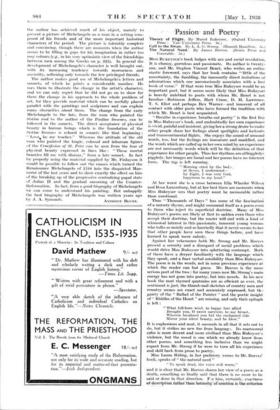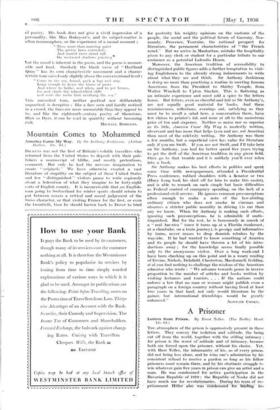Passion- and Poetry
Call to the Swan. By L. A. G. Strong. (Hamish Hamilton. 5e.) The Natural Need. By James Reeves. (Seizin Press amid Constable. 5s.) 'MISS RVICEYSER'S book bulges with sex and social revolution.
It is clumsy, garrulous and passionate. Its author is twenty- one, and Mr. Stephen Vincent Benet, who writes an enthu- siastic foreword, says that her book contains " little of the uncertainty, the fumbling, the innocently direct imitations of admiration which one unconsciously associates with a first book of verse." If that were. true Miss Rukeyser would be an important poet, but it seems more likely that Miss Rukeyser is heavily indebted to poets. with :whom Mr. Benet is not familiar—Robinson Jeffers, Hart Crane, D. H. Lawrence, T. S. Eliot and perhaps Rex Warner—and innocent of all contact with older poets who have formed the tradition with which Mr. Benet is best acquainted.
• " Breathe in experience, breathe out poetry" is the first line
in Miss Rukeyser's book, and undoubtedly her own experience is vivid, painful and insistent, giving her a strong desire to make
other people share her feelings about spotlights and lockouts and transcontinental flights. She enjoys the sound of unusual words, too, but the feelings are immature and muddled, and the words which are called up in her own mind by an experience are not necessarily words which will be the definition of that experience for other people. Thus her rhythms areal' higgledy".
piggledy, her images are banal and her poems have no inherent form. The tap is left running.
• " Morning cried by the, bed : . at Seven, 'I understood—. by Eight, I was very God, happiness in my head."
At her worst she is a cross between Ella Wheeler Wilcox and Rosa Luxemburg, but at her best there are moments wheig
Miss Rukeyser sees that poetry must be memorable rather than emotional.
Thus " Thousands of Days " has some of the fascination of a nursery rhyme, and might commend itself as a poem even to those who reject its superficial doctrine. Many of Miss Rukeyser's poems are likely at first to sadden even those who accept their doctrine, but the reader will end with a kind of whimsical interest in this passionate, innocent young woman who talks so noisily and so hurriedly that it never occurs to her
that other .people have seen these things before, and have learned to speak more imaludy.
Against her vehemence both Mr. Strong and Mr. Reeves present a serenity and a disregard of social problems which would drive Miss Rukeyser into spluttering contempt. Both of them have a deeper familiarity with the language which they speak, and a finer verbal sensibility than Miss Rukeyser. The poem is in the words, not in some previous experience at which the reader can but guess. Mr. Reeves is the more serious poet of the two : for many years now Mr. Strong's main energy has not gone into poetry, but into novels. In his new book the neat rhymed quatrains are as efficient as ever, the sentiment is just, the thumb-nail sketches of country men and country scenes are exact and accurately expressed, but tin gaiety of the " Ballad of the Painter " and the poetic insight of " Riddles of the Heart " are missing, and only their epitaph is left :
" What hill-born wind, to happy fate allied Brought you, 0 sweet survivor, to my breast, Wherein becalmed you bid the enchanted tide Mirror your silent beauty, and be blest."
It is euphonious and neat, it succeeds in all that it sets out to do, but it strikes no new fire from laoguag.m. Its marmoreal Balm is more decent and more civilised than Miss Rukeyser's violence, but the mood is one which we already know frost other poems, and something less inclusive than we might expect from Mr. Strong if he were to turn all his experience and skill back from prose to poetry.
Miss Laura Riding, in her prefatory verses to Mr. Reeves' book, speaks of " the natural need "
" To speak dead, the voice still warm,"
and it is clear that Mr. Reeves shares her view of a poem as a death, something so finally said that there is no more to be said or done in that direction. F.mr him, certainly, exactness
of descriptiidi lather-thin Intensity-of eniationis thi oiterion
of poetry. His book does not give a vivid impression of a personality, like Miss Rukeyseis, and its subject-matter is often commonplace, or the experience of a casual moment :
" Then mire-than-morning quiet The pretty lawn extended; And rooted trees stood tall On westward shadows pointing"
but the mood is inherent in the poem, and the poem is memor- able and final. Similarly the blank verse of " Hartland Quay" has its own characteristic movement and a charac- teristic tone raised only slightly above the conversational level :
" Come to the sea, friend, pack a bag and stay Low, enough to krow the times of posts And where to bathe, and when, and to get brown. Co and climb the inland-tilted cliffs and scale the rocks that overhang the sea."
This unexcited tone, neither poetical nor deliberately unpoetical, is deceptive : like a face .seenand hardly noticed in a crowd, the lines are more memorable than they appear to
be, and like the eighteenth-aentury poetry of Shenstone, Blair or Dyer, it can be read in quantity without becoming dull.
MICHAEL ROBERTS.















































 Previous page
Previous page